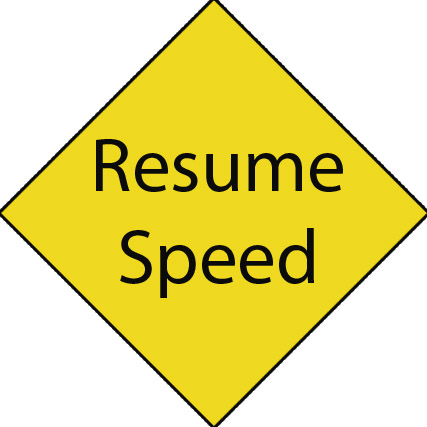by Dr. Joseph Barber
When commuting to and from work on SEPTA regional rail, there is plenty you can learn from staring out of the window (at least, before you fall asleep and start drooling). For example, I have seen one house next to the railway line that seems to have a horse in its garden. Being social creatures with long legs that need stretching, a garden-living horse doesn’t sound like the best idea. I have seen a taxi graveyard, where old, battered taxis rust mostly in peace, their innards strewn over the ground and picked over for anything useful. The newer, working taxis reside in the lot next door. Perhaps their proximity to the graveyard makes them stay more reliable on a day-to-day basis, as if to say to them, “stay working, taxi, or you know where you will end up”.
The other day, I saw a sign along the railway track that read “Resume Speed”. Now, working at Career Services, my brain is specifically attuned to terms such as CV and résumé, and so it is perhaps not surprising that I completely misread this sign.

“Résumé speed? What on earth is résumé speed, and why are train drivers interested in the speed of job application materials?” I would have said, if I wasn’t on a train full of people who would have thought me somewhat crazy to be talking to myself early on a Thursday morning.
Fortunately, the commonsense part of my brain stopped drooling, and woke up in time to set me straight. Of course, the sign was actually telling train drivers to return to some speed they were travelling at before they had slowed down for something. Yes, that makes much more sense. However, it did get me thinking. Is there such a thing as ‘résumé speed’ when it comes to job applications. It wouldn’t refer to the speed of creating a résumé, because that should be a slow, careful, and continuous process. It might refer, though, to the speed at which employers read your résumé. In certain cases, ‘résumé speed’ is extremely fast – much faster than the regional rail at any rate. You often hear that employers may spend only 30-45 seconds reading your résumé. No-one knows for sure if this is accurate, but it would probably be a good idea to write your résumé as if you only get 30-45 seconds to impress. You résumé should showcase those key skills that are most applicable to the job you are applying for – and thus your résumé will look different for every job to which you apply. If you want to know how successful you have been at getting the message across about your skills, hand your résumé to a friend, count to 30, and then snatch it away from them. Ask them what stood out the most from their brief reading of the document. If they say the fancy font you used for your name, the funny e-mail address you have (e.g., boblookingforjobs@yahoo.com), or the fact that the résumé was hard to read, then this means that you probably need to spend some more time on it.
If leadership and staff management are key requirements for the job you are applying to, then what you want, of course, is for your friend to say something like, “Oh my…, you certainly have a lot of leadership experience; that’s a jolly good show, old chap”. In this case, your friend is English, pretending to be English, or being possessed by the ghost of an Englishman. But if your foreign/strange/possessed friend can spot the skills you are highlighting, then so too will potential employers.
You are now clear to ‘resume speed’, and we’ll see you at Career Services where we have more advice and assistance if you need it.











